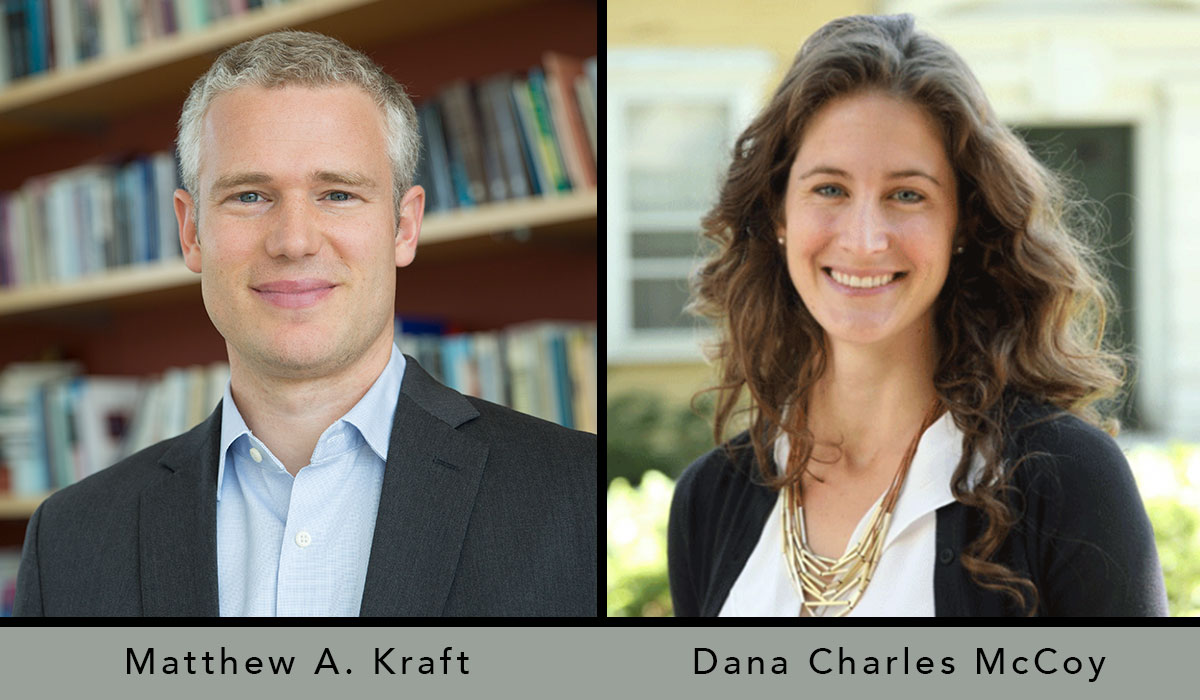SREE Announces Recipients of the 2021 Early Career Award
The Society for Research on Educational Effectiveness is pleased to announce the honorees of the 2021 SREE Early Career Award, which recognizes early career scholars whose work has advanced rigorous research relevant to educational practice: Matthew A. Kraft, Brown University and Dana McCoy, Harvard University. Kraft and McCoy were selected from a competitive pool of candidates. Matthew Kraft received his Ed.D. in Quantitative Policy Analysis of Education from the Harvard Graduate School of Education and is an Associate Professor of Education & Economic at Brown University. His scholarship focuses on efforts to improve teacher and organizational effectiveness in K–12 public schools, and he has made a conscious effort to share his work beyond academic audiences. As summarized by his nominator: Matt has become a leading national voice on education policy, particularly on issues related to K-12 teacher policy and on building capacity for the use of evidence to inform decisions making. Most notably, his research and public engagement has helped shape the national dialogue on how best to design and implement effective teacher evaluation systems. For example, his research has helped policymakers adopt a more nuanced understanding of “teacher quality” as multidimensional, dynamic (e.g., changing over time), and influenced by context. Beyond changing mindsets, he has been a leader in producing path breaking research that identifies how policymakers can best promote teacher improvement through coaching programs and building more supportive professional environments. Dana Charles McCoy is an Associate Professor at the Harvard Graduate School of Education. She received her PhD in Psychology & Social Intervention with a concentration in quantitative analysis at New York University. Her scholarship is broadly focused on young children’s social and emotional development – with particular focus on self-regulation and executive function – in the context of poverty and other ecological risks. Her research is situated in low-income communities in the U.S. as well as internationally. As summarized by her nominator: A hallmark of Dana’s work to date, and the primary area where she is leading, both from an intellectual and conceptual standpoint as well as a driver of the scholarship itself, has been in developing practical, empirically rigorous tools that capture young children’s development and early experiences in ecologically relevant ways. One tool stands out in particular: the Caregiver-Reported Early Development Instruments (CREDI), which was developed to enable global actors to move beyond gross proxy measures of early functioning (e.g., stunting, malnutrition, and percent living in poverty) and instead measure children’s actual skills based on caregiver reports in key developmental domains, such as language, motor skills, cognitive, and social-emotional…it is hard to overstate how critical a developmentally-informed and cross-culturally relevant tool is to that global endeavor. This is the first time in history that all 193 UN member nations have agreed to target early childhood development as a global outcome, a goal that would not be possible without the CREDI. In recognition of their accomplishments, Kraft and McCoy will be recognized at the 2021 SREE Conference in September and also have the opportunity to organize a session for that meeting.
The Society for Research on Educational Effectiveness is a professional organization dedicated to advancing research relevant to practice, from early childhood through post-secondary education. The Society strives to generate knowledge and facilitate applications in new contexts and across fields. Its over six hundred members represent individuals from across the United States and around the world. To learn more about the organization or the early career award, visit www.sree.org. |

